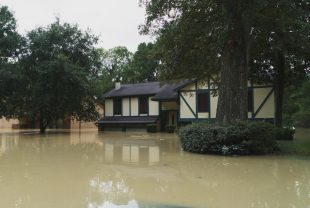NEWS RELEASE
Amy McCaig
713-348-6777
amym@rice.edu
Why middle-class residents want to stay put after floodwaters recede
HOUSTON – (Aug. 9, 2021) – Flood disasters like Hurricane Harvey lead some people to move far from the places they had called home. But a new study from Rice University and the University of Wisconsin-Madison finds that middle-class people who made long-term plans to stay in their neighborhoods before they flooded are less likely to relocate even if they suffered significant damage.
 The study’s findings are outlined in “Best Laid Plans: How the Middle Class Make Residential Decisions Post-Disaster,” which will appear in an upcoming edition of the journal Social Problems. The paper is now available online.
The study’s findings are outlined in “Best Laid Plans: How the Middle Class Make Residential Decisions Post-Disaster,” which will appear in an upcoming edition of the journal Social Problems. The paper is now available online.
Researchers Anna Rhodes, an assistant professor of sociology at Rice, and Max Besbris, an assistant professor of sociology at Wisconsin-Madison, examined how Harvey affected the housing decisions made by middle-class residents of Friendswood, Texas, a suburb of Houston. Over the course of two years after the storm, the researchers conducted a series of interviews with residents in 59 households that flooded.
Rhodes, the study’s lead author, said flood victims who stayed put did so because of plans they made before the storm. Most of the people who were interviewed stayed in their homes, even though they not only had the financial means to move, they also faced pressure from friends and family to relocate to less vulnerable places with similar amenities.
“What we found is that massive damage, social pressure and the revealed risk of living near a creek that severely overran its banks during Harvey were not enough to get most residents to consider leaving Friendswood,” Besbris said. “Instead, most people thought they would stay in their homes for many years to come and these plans were very durable.”
On the other hand, most of the households who decided to move after the storm indicated they left because they had already made well-defined plans to a move before the hurricane hit.
“In the face of an unexpected residential decision after Hurricane Harvey, it was residents who were already thinking about moving that were most likely to decide not to return to their flood-damaged homes,” Rhodes said.
She also noted that none of the families who chose to stay or leave were offered buyouts. In order to help people living in vulnerable areas consider moving, Rhodes said it’s important to understand how they ultimately make the decision to stay or leave.
“Future work dealing with post-disaster policies should be designed with mobility in mind,” Rhodes said.
-30-
For more information or to schedule an interview with the authors, contact Amy McCaig, senior media relations specialist at Rice, at 713-348-6777 or amym@rice.edu.
This news release can be found online at news.rice.edu.
Follow Rice News and Media Relations on Twitter @RiceUNews.
Photo link: https://cpb-us-e1.wpmucdn.com/news-network.rice.edu/dist/c/2/files/2017/09/KINDEREA-b-1ej97mu.jpg
Photo credit: Rice University
Located on a 300-acre forested campus in Houston, Rice University is consistently ranked among the nation’s top 20 universities by U.S. News & World Report. Rice has highly respected schools of Architecture, Business, Continuing Studies, Engineering, Humanities, Music, Natural Sciences and Social Sciences and is home to the Baker Institute for Public Policy. With 3,978 undergraduates and 3,192 graduate students, Rice’s undergraduate student-to-faculty ratio is just under 6-to-1. Its residential college system builds close-knit communities and lifelong friendships, just one reason why Rice is ranked No. 1 for lots of race/class interaction and No. 1 for quality of life by the Princeton Review. Rice is also rated as a best value among private universities by Kiplinger’s Personal Finance.

